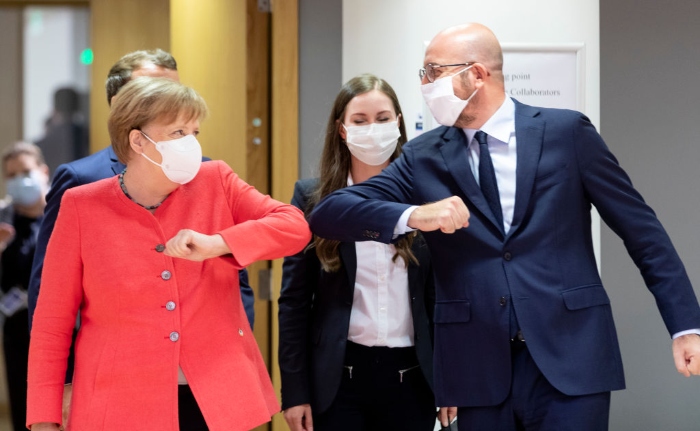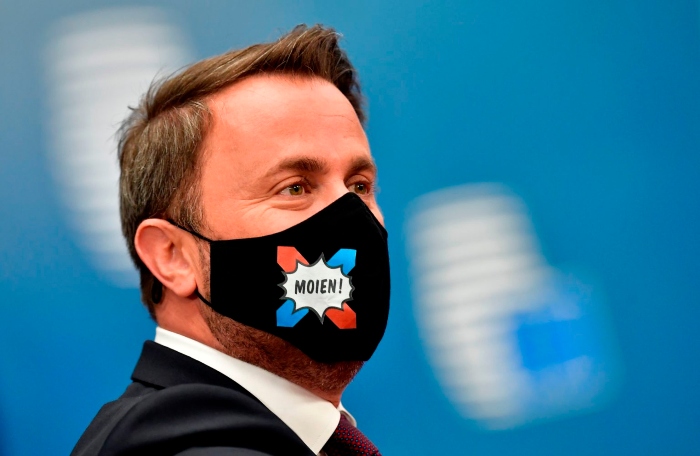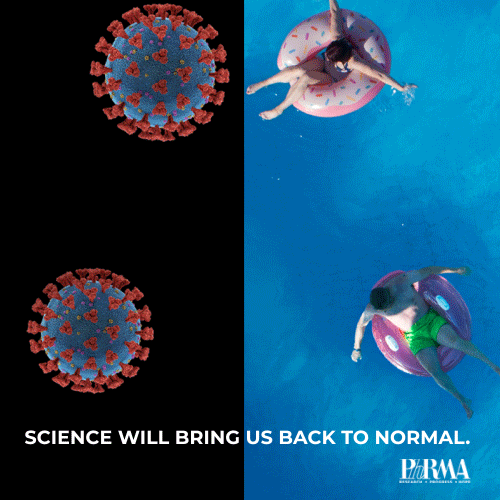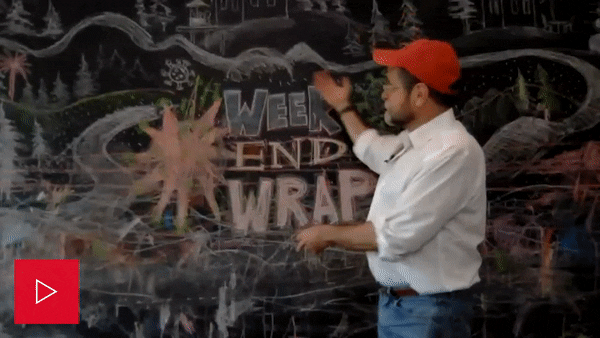
BY RYAN LIZZA AND RENUKA RAYASAM
|
With help from Myah Ward
UNEASY RIDER — When the trooper from the local sheriff’s office in Buffalo County, Nebraska, pulled me over for going a little too fast, I was stunned. My girlfriend and I were driving across the country this week — safer than flying, we calculated — and I had read that police departments had retreated from enforcing minor speeding offenses in order to limit officers’ potential exposure to coronavirus. During a pandemic, why stop someone going 7 miles over the speed limit after midnight on a relatively desolate section of I-80?
But what was more jarring was when the officer lowered his head almost into the passenger side window. He wasn’t wearing a mask. As he politely explained that he would just be issuing a warning, in the glow of his vehicle’s headlights we could see droplets of spit spewing from his mouth into the car.
In the summer of 2020, after months of quarantine and the siren song of good weather and many states reopening, travel in America seemed manageable. But I learned it requires a never-ending series of cost-benefit analyses. Many of them are impossible to calculate.
Some are easy: Flying is considered one of the most high-risk activities. Want to reduce your exposure? Find an airline that doesn’t sell middle seats (increasingly difficult), don’t take connections (ditto) and spring for a first class ticket (out of reach for many).
We planned a road trip that avoided big cities, used small hotels and spent much of the time inside the car on scenic routes or in the outdoors with few people around.
Even so, we couldn’t completely eliminate risk. Along 3,500 miles across 13 states — from L.A. to northern California, and then back across the country to Washington, D.C. — the most conspicuous observation was the inconsistency, regardless of the official rules, to wearing masks and practicing social distancing.
Almost everyone strolling around Venice Beach as we drove through it had a covered face. But a maskless cashier at a gas station in the tiny town of Eureka, Nevada, was aghast when she saw someone enter her store with a mask. There are obvious cultural divides. At a rest stop in Ohio, not a single person among a large group of Amish was wearing a mask.
Navigating the country at this moment is a minefield. I never forgot to wear a mask when entering a store, but it didn’t occur to me until I was stopped by that cop that I should put one on when paying a toll.
Some places have suspended the work of toll-takers, but others haven’t. In Ohio, a woman working in a tollbooth at the western end of I-80 wore a mask, while the woman at the eastern end did not.
Where rules exist, enforcement is equally unpredictable. At a small casino I checked out in Ely, Nevada, signs mandated masks but nobody told the maskless gamblers smoking and pulling the levers on slot machines to leave.
Signs of the virus are everywhere — as well as the signs of our inadequate response. Nearing Des Moines, Iowa, a highway sign said: “Test Iowa. Pre-approved Only. Next Exit.” If we had widespread instant testing for anyone who wanted it, there would be no “pre-approved” caveat. Not all mask wearing was predictably partisan: There was a woman in a Trump-branded mask at a rest stop in Ohio.
Every political journalist who travels West of the Appalachians starts thumbing through Democracy in America for a good quote. I’m no de Tocqueville, but observing the scattershot approach that Americans are taking to curbing the spread of this awful disease, I couldn’t help but think of this line from his account of touring the U.S. in 1831: “The health of a democratic society may be measured by the quality of functions performed by private citizens.”
By that standard, the pandemic has revealed American democracy in July 2020 to be deeply unhealthy.
Welcome to POLITICO Nightly: Coronavirus Special Edition. Covid hits Bollywood royalty. Reach out rrayasam@politico.com or on Twitter at @renurayasam.
A message from PhRMA:
America’s biopharmaceutical companies are sharing their knowledge and resources more than ever before to speed up the development of new medicines to fight COVID-19. They’re working with doctors and hospitals on over 1,100 clinical trials. Because science is how we get back to normal. More.
| FROM THE HEALTH DESK |
‘THINGS ARE THE WORST THEY’VE EVER BEEN’ — The daily death count is approaching 1,000. States are ordering body bags and refrigerated trucks. Patients are lined up along the walls in overcrowded hospitals. And the coronavirus is spreading north, gaining footholds in places like Illinois and Washington state that had hoped the worst was behind them, writes health care reporter Dan Goldberg. Six months into the worst pandemic in modern history, a disturbing new normal has settled over a country. Younger, healthier people are circulating in public spaces. Older adults are still quarantined. Millions of essential or blue-collar workers are still doing their jobs because they can't telecommute. Minorities carry a disproportionate share of the health burden and economic pain, and morgues struggle to keep up.
“Things are the worst they’ve ever been in the U.S., and they are spiraling out of control,” said Peter Hotez, dean of the National School of Tropical Medicine at Baylor University.
Yet the panic and urgency that led most of the country to lock down in March and April is mostly absent this summer, giving way to a new desensitizing reality where hundreds of Americans die every day. Instead of urging caution and adhering to the White House’s coronavirus task force’s own guidelines for reopening the economy, President Donald Trump pushed for a swift reopening, praising governors who lifted restrictions and calling to liberate states from governors who did not.
How much worse will it get? The beginning of the summer looked good for a little while. Then, states in the South and West started seeing new coronavirus surges. Now, the virus appears to be out of control in at least 18 states. Renu explains why the worst has yet to come, in the latest POLITICO Dispatch.
NEW THIS WEEK – POLITICO’S “FUTURE PULSE” NEWSLETTER : 2020 has wrought a global pandemic that has accelerated long-simmering trends in health care technology. One thing is certain: The health care system that emerges from this crisis will be fundamentally different than the one that entered. From Congress and the White House, to state capitols and Silicon Valley, Future Pulse spotlights the politics, policies and technologies driving long-term changes on the most personal issue for Americans: Our health. SUBSCRIBE TODAY.
| FIRST IN NIGHTLY |
PANDEMIC POLLUTION — New York has lost Broadway, its world-famous museums and the restaurants that made it an international destination, but one facet of city life making a coronavirus comeback is one that no one wants: traffic. More than an annoyance for commuters, a recent resurgence in city car travel is threatening decades of gains in the city's air quality, writes New York City Hall reporter Danielle Muoio.
Thanks to New York's subway system, transportation in the five boroughs is currently responsible for only 30 percent of New York’s greenhouse gas output. But in the era of Covid-19, driving is rebounding faster than ridership on the Metropolitan Transportation Authority's subways and buses since the height of the coronavirus pandemic in March and April. And budgets for mass transit programs are cratering as the city reels from the economic fallout of the pandemic — a blow that could impact service and further spurn residents from taking subways and buses.
Environmental advocates fear the worst — a decline in subway and bus service that further deters already reluctant New Yorkers from returning to mass transit and a rise in personal car use that could become a more difficult habit to break over time. “If people are not getting on the trains because service is bad, they’re worried about social distancing, it’s not going to come back,” said Eddie Bautista, the executive director of the New York City Environmental Justice Alliance.
| THE GLOBAL FIGHT |
PACIFIC RIFT — The pandemic has fundamentally altered the U.S.-China relationship, said David Wertime, editorial director for China and author of the China Watcher newsletter. And it’s a change that will last, no matter who wins the White House in November.
Trump is making China his scapegoat, and that won’t be easy to undo. Since the pandemic, Trump has stopped saying anything favorable about Chinese Communist Party Chairman Xi Jinping. Diplomatic relations, an often useful tool to balancing public statements, have ground to a near-halt. As David said to your host: Chinese diplomats don’t do Zoom.
Trump and his administration’s rhetoric will have long lasting effects even once the pandemic ends. So will a proposed White House policy to exclude foreign students from American universities. Even though it was later reversed, Chinese students will be reluctant to come to the U.S. in the future.
The damaged relationship has also jeopardized U.S. public health . “I don’t think we in the U.S. have fully wrapped our minds around what it means if China discovers a vaccine first,” David said. Chinese leaders would naturally prioritize their own citizens and could require diplomatic concessions from the U.S. before sharing a drug. And a vaccine discovered in China might induce skepticism on the part of some Americans who might already be wary of vaccines.
It didn’t have to be this way. “The pandemic presented substantial opportunities to deepen or strengthen the relationship. Cooperation could have been the watch word,” David said. “That’s not the universe in which we live.”
Before 2020, Trump took his usual carrot-and-stick approach to cajoling Asia’s largest economy into buying more U.S. exports and in other dealings. But coronavirus has become the single biggest threat to Trump’s reelection effort. That reality, combined with the emerging consensus that Beijing is incapable of reform, has focused White House attention on China and its role in originating the virus. It has also accelerated a disentangling already underway between the two powers.
“The outbreak of Covid,” David said, “created every incentive for the administration to take an extremely hard line rhetorically in ways that will be difficult to unwind beyond 2020.”

German Chancellor Angela Merkel elbow-bumps President of the European Council Charles Michel during an EU summit in Brussels, Belgium. Michel has called the summit to discuss the EU's post-coronavirus recovery plan and the 2021-2027 budget. | Getty Images
| PUNCHLINES |
‘A BIG, EPIC WAR OVER REFRIED BEANS’ — Matt Wuerker takes us through the news week in satire and cartoons, including the Trump family’s support for Goya Foods, the CDC’s handling of coronavirus data, Jeff Sessions’ Alabama Senate primary loss and much more, in the latest Punchlines.
| ASK THE AUDIENCE |
Nightly asked you: Do you support more or fewer pandemic restrictions in your area? Which ones do you think are most important or least necessary? Below are some of your lightly edited responses.
“The restrictions we currently have on Maui are sufficient. We wear masks when we enter any public place. On the street, fewer people are masked, and there is not much concern. However, tourists will be allowed back on the first of September. After that, who knows?” — Stanley Morris, retired, Kula, Hawaii
“We don’t need more restrictions here, just people who will follow the rules. We have an executive order from our governor to wear masks in public. What we need is better compliance. Masks and reduced capacity limits for restaurants are the two easiest steps to take. Stop politicizing masks!” — Chris Hiland, advertising, West Cornwall, Ct.
“More. Mask mandates and better enforcement are needed. Also, we need better plans for how to open schools before moving ahead.” — Tammy Flowe, meteorologist, Springfield, Va.
“I'm always for fewer restrictions. I don't think anybody should be forced to go out, and I think people that are not comfortable going out should be protected, and they should have the right to stay inside. However, I don't think businesses, or any individuals for that matter, should be forced to remain inside.” — Erin Emrath, data scientist, Chicago
“In favor of more restrictions, as cases surging around the country will affect us again soon. We need to reinstate capacity limits on public transit and we should close down outdoor bars which aren’t enforcing capacity limits and are crowded, especially on weekend nights.”
— ANN SCOTT, THERAPIST, OCEAN, N.J.
|
“Most important is the total restriction of interstate travel both commercial and personal. Clearly, with the Covid pandemic out of control, every state is a singular political entity and must protect its borders.” — Shirley McRae, retired, Port Townsend, Wash.
“I live in Scotland, but here is my two-pence worth: It’s a public health issue, not a 'freedom' issue, so do what works to safeguard you and your family. If that means certain restrictions that frankly none of us are used to, then so be it. It. If you break your arm, you have a cast on for six weeks, which is an inconvenience, but you know it’s for your own good.” — Ronaldo Madrebien, health consultant, West Lothian, U.K.
“If we had used the time during the shutdown to set up a national strategy, as virtually every other country on the planet did, we wouldn't be having this conversation. After wasting all that time and money and putting the American people through extreme hardships, it will not end. No matter what we do at this point, we're worse off than ever before.” — Michael Marullo, consultant, St. Rose, La.
BECOME A CHINA WATCHER: Expert views of Beijing are quickly darkening. How should the U.S. deal with Xi Jinping’s regime? Join the conversation and gain expert insight from informed and influential voices in government, business, law, tech and academia. China Watcher is as much a platform as it is a newsletter. Subscribe today.
| NIGHTLY NUMBER |
0
The number of citations issued by the Atlanta Police Department for violating the city’s mask mandate as of Thursday, according to a department spokesperson.
|
| PARTING IMAGE |

Prime Minister of Luxembourg Xavier Bettel arrives at the EU budget summit in Brussels wearing a mask that says "Good morning" in Luxembourgish. | AFP via Getty Images and EPA
WHO WORE IT BEST? As Europe's guidance on masks evolves , EU leaders arrived at the bloc’s budget summit in Brussels wearing a wide range of protective gear — from the snazzy to the subdued — to guard against the coronavirus. Look through the masks Europe’s top officials wore and vote for your favorite.
A message from PhRMA:
America’s biopharmaceutical companies are sharing their knowledge and resources more than ever before to speed up the development of new medicines to fight COVID-19. They’re working with doctors and hospitals on over 1,100 clinical trials.
And there’s no slowing down. America’s biopharmaceutical companies will continue working day and night until they beat coronavirus. Because science is how we get back to normal.
See how biopharmaceutical companies are working together to get people what they need during this pandemic.
And there’s no slowing down. America’s biopharmaceutical companies will continue working day and night until they beat coronavirus. Because science is how we get back to normal.
See how biopharmaceutical companies are working together to get people what they need during this pandemic.
Did someone forward this email to you? Sign up here.
Follow us on Twitter
Renuka Rayasam @renurayasam
|
FOLLOW US
|




No comments:
Post a Comment
Note: Only a member of this blog may post a comment.